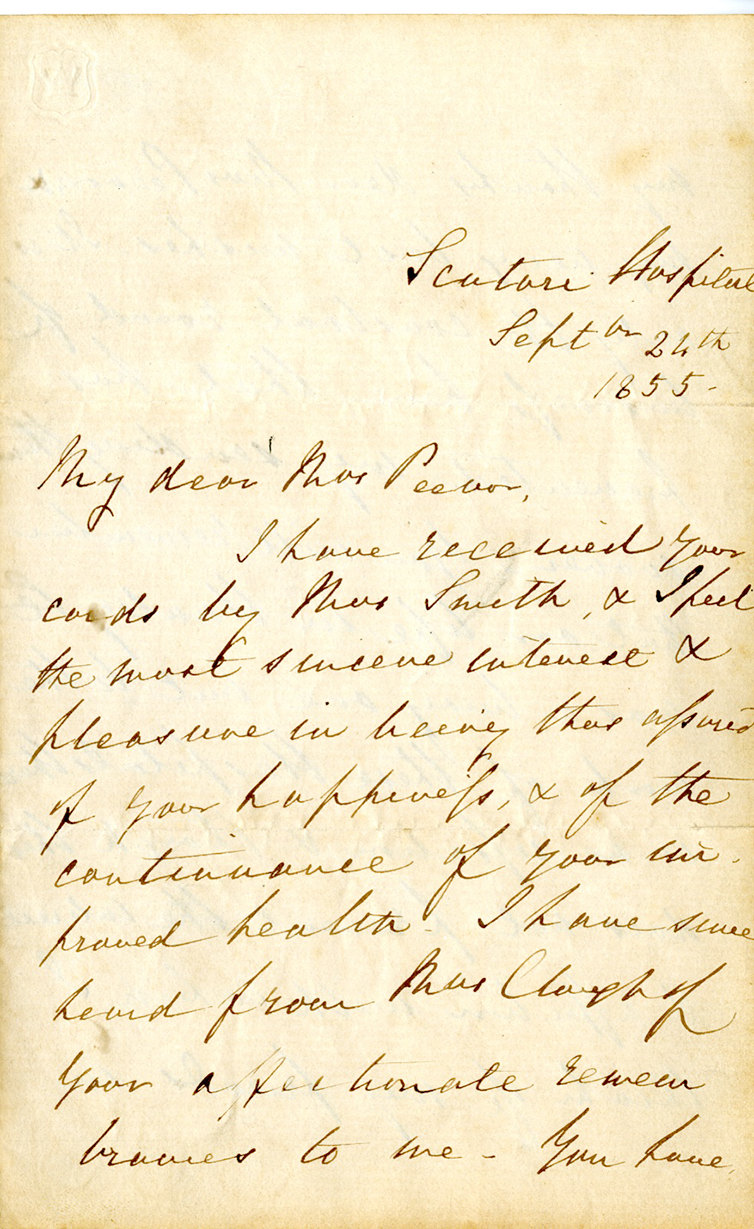 Shown here is one of the eight letters recently donated to UAB by The Upper Room, Nashville, TN.
Shown here is one of the eight letters recently donated to UAB by The Upper Room, Nashville, TN.
We are pleased to announce that eight additional Nightingale letters have joined the 50 already held in the collection. These letters were generously donated to UAB by The Upper Room, a faith-based organization of Nashville, Tennessee, upon the closure of its Christian Art Museum in January, 2020. They are held in the Reynolds-Finley Historical Library on behalf of the UAB School of Nursing.*
These letters range in date from 1855 to 1893 and discuss such topics as public health in India and Nightingale’s ongoing charity and relief work, which are also covered in the original letters donated by Dr. Reynolds, as discussed previously in this exhibit. Therefore, they complement the collection well. With regards to India, these letters further demonstrate that Nightingale gathered information and exerted influence on those within the British government. Not only did she maintain an active correspondence with Dr. Hewlett in India, but she also kept abreast of parliamentary discussions and met with the Secretary of State for India, Sir Stafford Northcote, to review the public health situation. Another particularly fascinating letter concerns Nightingale’s hospital work in Balaklava during the Crimean War, the experience that originally made her a famous and heroic figure. All of these new letters are also now available to view online in the UAB Digital Collections.
The New Letters
Florence Nightingale letter to Mrs. Peevor, September 24, 1855
Written from the Scutari Hospital in Turkey during the Crimean War, in this letter Nightingale discusses the busy-ness of hospital nursing work. She particularly emphasizes the impact of the war and describes the work at Scutari as well as the hospitals under her care in Balaklava, Crimea, as having no cessation. Throughout the difficult times, however, she finds comfort in remembering past times and friends in England.
Florence Nightingale letter to Reverend W. Cardale, November 5, 1862
In this letter, Florence Nightingale thanks Reverend W. Cardale for offering to receive contributions on behalf of “Pastor Fliedner’s Syrian Insitutions” made through the Evangelical Alliance, a group dedicated to representing evangelical Christians in the United Kingdom. Nightingale received her nursing training from Pastor Fliedner’s school in Kaiserwerth, Germany.
Florence Nightingale letter to William H. Hare, Esq., December 23, 1862
In this letter, Florence Nightingale declines a request made on behalf of what she recognizes to be a “valuable charity.” While she acknowledges that “soldiers suffer from a variety of skin affections, boils, abrasions,” she explains that she cannot assist in the manner requested without breaking rules she has placed on herself. She also fears that the favor might be granted on behalf of her rather than the merits of the cause.
Florence Nightingale letter to J. J. Frederick Esq., June 2, 1865
In this letter, Florence Nightingale asks that the recipient, J. J. Frederick Esq., send her a copy of the parliamentary paper regarding Lord Stanley’s motion in Parliament concerning a report of the Royal Commission for India.
Florence Nightingale letter to Sir Stafford Northcote, August 20, 1867
In this letter, Florence Nightingale discusses setting up a meeting with Sir Stafford Northcote to talk over the ongoing question of Public Health in India. Sir Stafford Northcote was Secretary of State for India from 1867 to 1868.
Florence Nightingale letter to W. T. Harrison, September 16, 1873
In this letter, Florence Nightingale asks W. T. Harrison to give the enclosed to the Crown Princess of Germany, as desired by H. R. H. (Her Royal Highness).
Florence Nightingale letter to the Publishing Department of SPCK (Society for Promoting Christian Knowledge), April 29, 1893
In this letter, Florence Nightingale writes on behalf of her friend, Miss Brooke Hunt, who has written two manuscript “Sunday lessons” to the young men of the “Gordon Wanderers’ Club”, which Hunt founded. This club reached “rough” young men and provided them with financial and spiritual support through its education and facilities. Nightingale recommends that these manuscripts be printed and speaks highly of both these lessons and her friend, who she described as “the ‘Way’ & the Discipline”, in her mission work with young men.
Florence Nightingale letter to Miss Thore, [unknown date]
On behalf of her mother, Florence Nightingale thanks Miss Thore for a sonnet and includes details about returning a parcel to Thore in London.
*The Reynolds-Finley Library is grateful to The Upper Room and retired museum curator, Kathryn Kimball, as well as Dean Doreen Harper and the UAB School of Nursing, for entrusting these letters to our care.